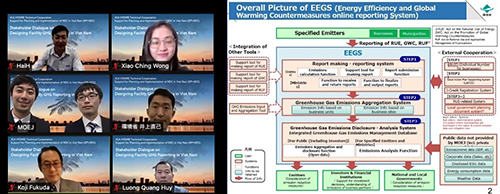- Home
- Technical Cooperation Projects
- Index of Countries
- Asia
- Viet Nam
- Support for Planning and Implementation of the Nationally Determined Contributions in Vietnam (SPI-NDC)
- Project News
- JICA Project launches Stakeholder Dialogue on Designing Facility GHG Reporting System of Vietnam
Project News
2021-12-15
JICA Project launches Stakeholder Dialogue on Designing Facility GHG Reporting System of Vietnam
Hanoi - December 15, 2021- In cooperation with the Ministry of Natural Resource and Environment (MONRE), JICA's Technical Cooperation to Support for Planning and Implementation of Nationally Determined Contributions (NDC) in Vietnam (SPI-NDC) co-organized a thematic event on Stakeholder Dialogue on Designing Facility Green House Gas (GHG) Reporting System of Vietnam.
Organized at the margin of the Vietnam-Japan Environmental Week of MONRE Viet Nam and Ministry of Environment Japan (MOEJ), the Dialogue offered an unique opportunity to acquaint Vietnamese agencies and stakeholders with international experiences on relevant reporting and emission management, and to invite stakeholders in the region to initiate a discussion to extract key lessons and essential elements for effectively designing and operating the upcoming GHG reporting system in Vietnam.
The Dialogue started with a recap of legal requirements of facility GHG reporting and policy direction towards constructing online system under the current regulation by the Department of Climate Change (DCC) of MONRE. SPI-NDC's support landscape across national, sectoral and private-sector capacity building to empower Government of Vietnam to plan and implement NDC, which encompasses capacity building for facility GHG reporting, was also highlighted.
The Governments of Japan and Singapore also joined the Dialogue, and both countries shared their practical experiences for implementing their facility-level GHG reporting system and practices to monitor their GHGs - more specifically, Japan's Mandatory GHG Accounting and Reporting System by MOEJ, and Measurement, Reporting & Verification (MRV) Framework under the Carbon Pricing Act of Singapore by National Environment Agency (NEA). In relation to the theme of transparency, MOEJ also shared regional support initiative on Partnership to Strengthen Transparency for Co-Innovation and shared initial lessons in the context of Vietnam.
In the second part of the Dialogue, Vietnam Technology Solutions, JSC shared initial lessons from on-going online Energy Consumption Reporting System in Vietnam according to the Law of Energy Efficiency and Conservation, and provided insights to upcoming design over Vietnam's GHG reporting system.
MOEJ also shared current Japanese experience on an integrated online reporting system called EEGS (Energy Efficiency and Global Warming Countermeasures Online Reporting System) as a means to consolidate different reporting mandates on energy consumption, GHGs and fluorocarbons into a single system.

The Dialogue delivered four key takeaways for enabling facility GHG reporting in Viet Nam.
- Facility reporting is an evolutionary process, it is the constant learning-by-doing process that brings an improvement in the system, and this serves as a crucial message from the perspective of expectation management (start simple, and sophisticate as we go);
- All three country experiences (Singapore, Japan's GHG reporting system and Vietnam's energy reporting) demonstrated clear linkages with existing energy reporting system, and cross-ministry collaboration remains to be the key success factor for GHG reporting.
- Reporting system nor regulation alone do not guarantee successful implementation. Country experiences suggest supporting mechanisms, tools, specific guidance and follow-up activities are essential ingredients for an effective operationalization.
- Capacity building remains to be an important building block. It is the human resources that runs the system, and empowering HR is a key for successful operation of facility GHG reporting system. This can be leveraged by partnerships.
More than 90 participants from both Vietnam and Japan from governmental agencies to private sector joined the dialogue and showed strong interest in the presentations
Presentation materials are available from the below weblink.
- About JICA
- News & Features
- Countries & Regions
- Our Work
- Thematic Issues
- Types of Assistance
- Partnerships with Other Development Partners
- Climate Change / Environmental and Social Considerations
- Evaluations
- Compliance and Anti-corruption
- Science and Technology Cooperation on Global Issues
- Research
- JICA Development Studies Program / JICA Chair
- Support for the Acceptance of Foreign HRs / Multicultural and Inclusive Community
- Publications
- Investor Relations
